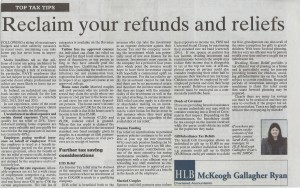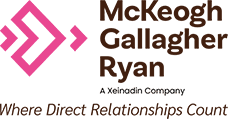HLB McKeogh Gallagher Ryan’s Sarah Kelly advises on the best approach to maximising your take home pay and claiming all available reliefs.
Following a string of recessionary budgets and strict austerity measures in recent years, maximising your take home pay has never been as important. Media headlines tell us that millions of Euros are going unclaimed by taxpayers for reliefs that they failed to claim through a lack of awareness. In particular, PAYE employees that are not subject to self-assessment rules and who do not obtain professional tax advice are more likely to leave tax refunds unclaimed.
tax advice are more likely to leave tax refunds unclaimed.
In Ireland, an individual can claim back income tax refunds for the last four complete tax years i.e. currently 2012, 2013, 2014 and 2015.
In our experience some of the most commonly overlooked expense claims and credits include the following:
- Un-reimbursed medical expenses and certain dental expenses. These may qualify for tax relief at 20%. Unreimbursed nursing home expenses are even more valuable and can qualify for tax relief at the marginal rate of income tax (currently 40%).
- Employers paying medical insurance on behalf of employees – while the employee is taxed as a benefit-in-kind through payroll on the gross insurance premium, often the benefit of the tax relief at source credit, deducted at source by the insurance company, is not claimed by the employee and is effectively lost.
- Employee flat rate expenses – allowable expenses are set for a wide range of employment categories e.g. nurses, teachers, hotel staff, firefighters etc. and run from circa €30 up to €700 for certain employments. The full list of categories is available on the Revenue website.
- Tuition fees for approved courses – an individual can claim tax relief on fees paid for Third Level courses in respect of themselves or any person as long as they have actually paid the qualifying fees. Qualifying fees means tuition fees (including the Student Contribution) but not examination fees, registration fees or administration fees, in respect of an approved course at an approved college.
- Home carer credit – married couples and civil partners who are jointly assessed may claim the credit where one spouse or civil partner is the Home Carer and cares for one/more dependent persons. The Home Carer’s income must not exceed €7,200 for the tax year. Full tax credit is due if the Home Carer’s income is less than €5,080. If income is between €7,200 – €9,200, reduced relief is granted. Where this tax credit is claimed the couple are not entitled to the increased standard rate band normally given to couples in a marriage or civil partnership where both spouses or civil partners are in receipt of income.
Further Tax Saving Considerations
EIIS Relief
An Income Tax relief may be claimed at the marginal rate of tax against all income sources where an investment of up to €150,000 is made in a qualifying company. EIIS relief is beneficial both to the investor who can take the investment as an expense deduction against their Income Tax and the company receiving the investment which can potentially avail of low cost finance for its business. Investments must remain in the company for a period of four years after which point the investor would hope to have their investment repaid with hopefully a commercial uplift on the investment. For the tax relief to apply the investment cannot be risk free and there can be no guaranteed return and therefore the investor must ensure that they are happy with the commerciality of the investment as well as the tax relief attaching. In certain instances EIIS relief can also apply to a director or shareholder making on an investment in their own company and this can be a nice bonus for the investor in that instance where they were going to put the money in regardless of the availability of tax relief.
Pension Funding
Tax relief on contributions to personal pension policies continues to be available at your top tax rate (currently 40%) and such pension funding can be used to reduce last year’s tax bill also. Employer pension contributions are one of the most attractive tax saving mechanisms available. They provide employers with a tax efficient way of rewarding key staff members as employer contributions to approved pension policies are not taxable as a benefit in the hands of the employee.
Married Couples
Spouses and Civil Partners may reduce their exposure to income tax, PRSI and Universal Social Charge by maximising their standard rate tax band (currently 20%). If one spouse or partner has low income, dividing investment and rental income between the couple may reduce their income that is chargeable to tax at the top tax rate. A self-employed spouse or partner could also consider employing their other half to maximise their standard rate tax band. Children can also be employed by self-employed persons and earn their keep so to speak! Relatives in these circumstances must be employed on a commercially justifiable basis.
Deeds of Covenant
If you are providing financial assistance to certain individuals you may wish to consider entering into a Deed of Covenant in that respect. Depending on the circumstances, the beneficiary could be tax exempt on the income received while the payer could obtain tax relief on the payments they make.
Gift/Inheritance Tax Reliefs
The Small Gift Exemption allows an individual to gift up to €3,000 in any tax year to another individual tax free e.g. parents could gift up to €6,000 (€3,000 max. each) per annum to a child tax free, grandparents can also avail of the same exemption for gifts to grandchildren. With some forward planning, this is a very tax efficient way to pass on wealth over time and save on gift tax or inheritance tax.
Dwelling House Relief provides a tax efficient way of passing on a home and is particularly useful for parents providing houses for children, avoiding gift/inheritance tax on the benefit subject to certain conditions. Required periods of occupation amongst other conditions to claim the relief mean that some forward planning may be required.
Clearly there are many tax savings out there to be availed of and they are easy to overlook if the proper tax advice is not taken. Taxes are high enough without also overpaying by mistake!
If you have any queries on the contents of this article please contact Sarah Kelly Manager in HLB McKeogh Gallagher Ryan’s Tax Department.
This article appeared in the Clare Champion on 5 August 2016.
